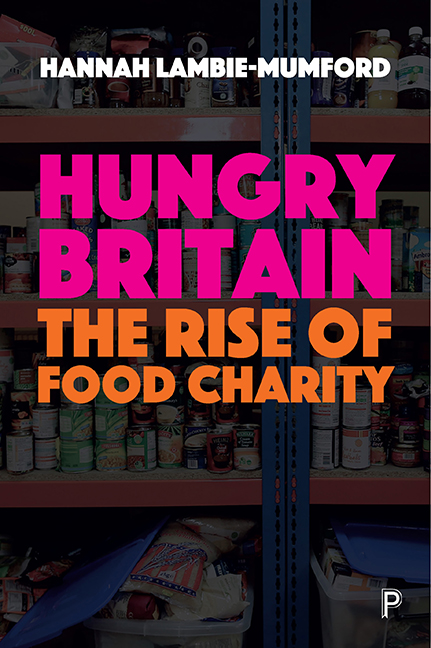Book contents
- Frontmatter
- Dedication
- Contents
- List of figures
- List of abbreviations
- Acknowledgements
- Foreword
- One Introduction
- Two Hunger and charitable emergency food provision in the UK and beyond
- Three Theories of the food insecurity ‘problem’ and the right to food ‘solution’
- Four Food charity: the ‘other’ food system
- Five The sustainability of food charity
- Six Food charity as caring
- Seven Food charity and the changing welfare state
- Eight Conclusion
- References
- Index
Four - Food charity: the ‘other’ food system
Published online by Cambridge University Press: 05 April 2022
- Frontmatter
- Dedication
- Contents
- List of figures
- List of abbreviations
- Acknowledgements
- Foreword
- One Introduction
- Two Hunger and charitable emergency food provision in the UK and beyond
- Three Theories of the food insecurity ‘problem’ and the right to food ‘solution’
- Four Food charity: the ‘other’ food system
- Five The sustainability of food charity
- Six Food charity as caring
- Seven Food charity and the changing welfare state
- Eight Conclusion
- References
- Index
Summary
This chapter explores the question of whether receiving food from emergency food providers is an acceptable process of obtaining food, by right to food standards. It does so by exploring the nature of this provision in the cases under study and exploring key elements of how food is sourced by and acquired from them. In particular, the chapter explores whether emergency food provision as it is emerging in the UK forms a recognisably ‘other’ system of obtaining food, and considers critically what this might mean for the realisation of the human right to food in the UK.
The analysis presented here is framed by two particular sets of arguments. In the first instance, evidence from this research is combined with previous findings from Tarasuk and Eakin (2005) to discuss how far emergency food provision forms an identifiably ‘other’ system of food acquisition. Comparing key characteristics of these charities (including the lack of recipient rights, recipient neediness and food operating outside the market) with the most readily accepted form of obtaining food – through shopping – indicates that they do form distinctly ‘other systems’.
However, theoretical and empirical evidence from Cloke et al. (2010) and Midgley (2014) also provides an analytical framework for exploring other data collected, which highlights the dynamic social and market-based qualities embedded in these systems. Cloke et al.'s (2010, p.101) work on organisational ethics – ‘the performance of organisational ethos’ – provides a framework for identifying the moral imperatives on which these systems are based, including ‘feeding the hungry’ and ‘preventing food waste’. Beyond these identifiable social qualities, Midgley's (2014) work also helps to identify how the foods provided in these systems could still be said to contain recognisable market qualities, through discourses of surplus and the donation of privately purchased foods. However, as further data shows us, while identifiable moral and market-based qualities do reside within these systems, this does not necessarily compensate for the ways in which they are experienced as ‘other’ by those who have to turn to them – and who are then themselves ‘othered’ through their participation in them.
The chapter argues that ultimately these organisations do make up an identifiably and experientially ‘other’ system of obtaining food.
- Type
- Chapter
- Information
- Hungry BritainThe Rise of Food Charity, pp. 57 - 74Publisher: Bristol University PressPrint publication year: 2017



